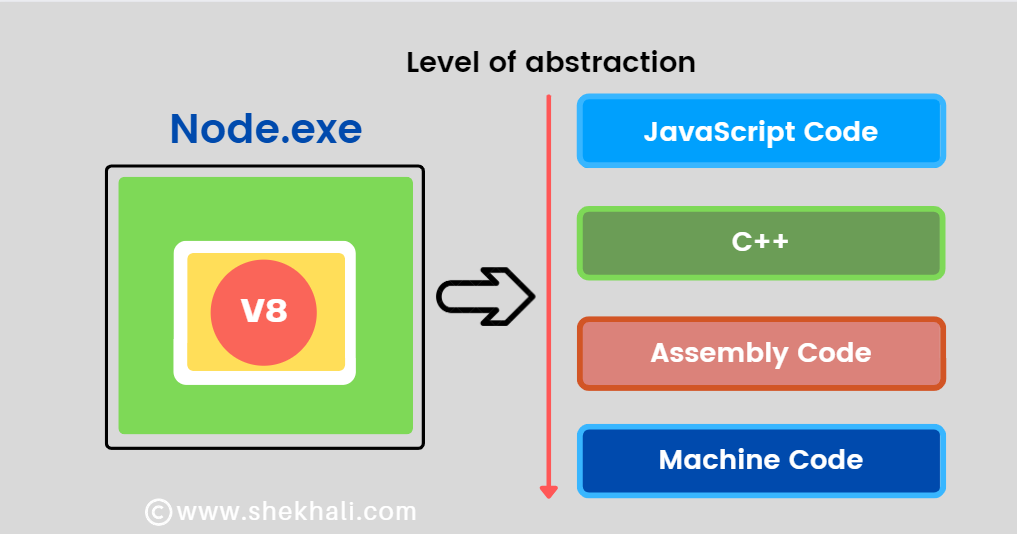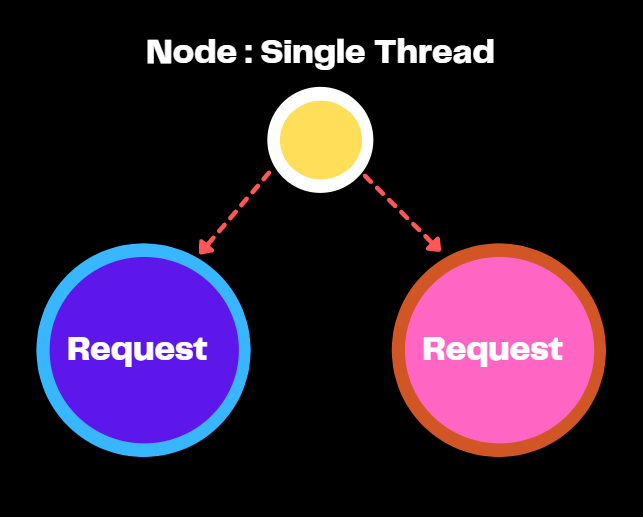Table of Contents
What Is Node.js?
Node.js is an open-source, cross-platform runtime environment and library for executing JavaScript code outside of a browser. It uses an event-driven, asynchronous, non-blocking I/O architecture, making it lightweight and efficient for data-intensive real-time applications running across distributed devices.
Node.js is neither a framework nor a programming language but a runtime environment. It was written and introduced by Ryan Dahl in 2009.
Node.js was built on top of chrome V8 JavaScript Engine that is written in C++ language. All the JavaScript code is executed by the V8 JavaScript engine; which converts the code into Assembly code, which is then converted into machine code. Machine code is something that a computer processor understands.

Node JS Single Threaded Event Loop Model
Node.js is an open-source, asynchronous, single-threaded server-side runtime environment for developing server-side web applications using JavaScript.
The single-threaded event loop model is a modern request/response model that uses less memory resources than the traditional multithreaded request/response model to process client requests and generate responses.
libuv: A specific library known as “libuv” is originally written in C programming for Node.js to provide an event loop mechanism and non-blocking I/O operations.
It facilitates an event-driven approach in which I/O and other activities are performed using callback-based notifications. Node.js runs on a single thread, but this library allows it to support thousands of concurrent connections via event loops.

Many web application technologies include MVC, ASP.NET, JSP, HTML, Ajax, and jQuery. However, all of these technologies follow a “multithreaded request/response” architecture to handle multiple concurrent clients.
Applications Of Node.js
Node.js can be used to develop applications such as:
- Real-Time Chats Applications
- Microservices / APIs
- Complex Single-Page Applications
- Internet of Things (IoT)
- Real-Time Collaboration Tools
- Video Streaming apps/websites.
- Multiplayer games
- Social media/messaging apps
Advantages of Node.js
Let’s take a look at the reasons why Node.js has caught the developer community’s attention and become one of the most popular technologies these days.
- Asynchronous and Event Driven: The primary reason for using Node.js is the ability to develop fast and asynchronous web apps. All APIs of the Node.js library are asynchronous, or non-blocking. It means that a NodeJs based server will never have to wait for an API to return data. The server moves to the next API after calling it and a notification mechanism of events of Node.js assists the server in receiving a response from the previous API call.
- Open Source: Node.js is open source, so it’s free to use and does not require a license.
- Cross-platform: It is cross-platform that runs on Windows, MAC, Linux, Unix, etc.
- Scalability: You can scale your Node.js application by Horizontal and Vertical Scaling, which helps you to improve your application performance.
Vertical scaling means increasing a node`s resources (CPU, memory, and so on) whereas horizontal scaling means adding more nodes to balance out the load on each node of an existing system.
Node’s scalability is achieved by load balancing to handle a huge number of concurrent connections. - Single-page application: Node.js can be used to develop a fast single-page application, i.e. Gmail.
- Support for REST API: You can easily create RESTful services APIs with Node.js.
- Uses JavaScript: Node.js uses JavaScript to build the entire server-side application. Developers who are already familiar with JavaScript will find it very easy to start developing projects with NodeJs.
- No Buffering: The data in a NodeJs application is never buffered.
- Active Community: Node.js is an open-source framework and has a very active and vibrant developer community that constantly contributes to its improvement.
- Performance: Node.js library is very fast in code execution because it is built on Google Chrome’s V8 JavaScript Engine.
Q: What companies are using Node.js?
Node.js is so popular that it is used by over 15 well-known organizations such as NASA, Medium, Trello, Netflix, PayPal, LinkedIn, Walmart, Uber, Twitter, Yahoo, Groupon, eBay, Mozilla, and GoDaddy.
Q: Is NodeJS frontend or backend framework?
A common misconception among developers is that Node.js is a backend framework but this is not the case. Node. js can be used on the front end as well as the back end.
Q: What are the drawbacks of NodeJS?
Node.js Performance suffers when it comes to heavy computational tasks, and because of the Unstable API, NodeJS invites a lot of code changes.
Q: What is Node JS in simple words?
Node.js is an open-source, asynchronous, single-threaded server-side runtime environment for developing server-side web applications using JavaScript. It is commonly used to develop real-time applications such as chat, Internet of Things (IoT), Microservices, APIs news feeds, and so on.
Q: What does Node.js offer?
Node.js can generate dynamic page content and is used to develop fast and scalable network applications. It can also create, open, read, write, delete, and close files on the server.
Q: Where Should You Not Use Node.js?
Node.js should not be used for CPU-intensive applications.
| Node JS History: | Visit Wikipedia to learn the history of Node.js |
| Download open-source Node Js: | https://nodejs.org/en/ |
| Node.js code on GitHub: | https://github.com/nodejs/node |
| Node.js community link: | http://nodeconf.com/ |
- C# 12 New Features in 2025: What’s New with .NET 8 - April 11, 2025
- Difference Between WCF and Web API with Examples: A Comprehensive Guide - March 27, 2025
- PUT vs PATCH vs POST in REST API: Key Differences Explained With Examples - March 23, 2025